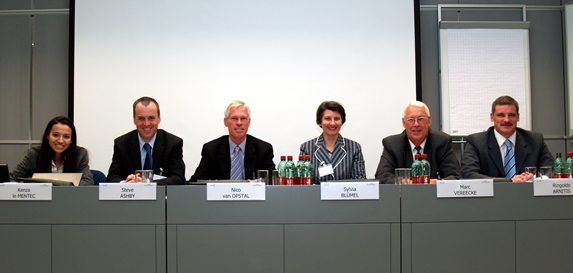
Recommendations and Conclusions from the EPPO Council Colloquium
'IPPC - How EPPO can cooperate more effectively'
Vienna, 2008-09-25
In connection with the EPPO Council session, a Colloquium was organized which dealt with the importance of the International Plant Protection Convention (IPPC) and its standards for National Plant Protection Organizations (NPPOs).
The purposes of this Colloquium were to:
- strengthen awareness of the importance of the IPPC in the EPPO region
- familiarize EPPO members with the rules and procedures of the IPPC
- explain how EPPO currently cooperates with the IPPC and discuss possibilities for improvement
- encourage EPPO members to get more closely involved in IPPC related activities
- agree recommendations on how EPPO could improve its contribution to what IPPC delivers

Chair of the Colloquium - Courtesy M. Kurzweil (AT)
View more pictures of Council Session and Colloquium
The following presentations were given:
IPPC and the World Trade Organization
Ms Kenza le Mentec (Counsellor in the Agriculture and Commodities Division of the World Trade Organization).Impact of IPPC and its standards on NPPO in Latvia
Mr Ringolds Arnitis (Director of the Latvian NPPO).Decision making in the Commission on Phytosanitary Measures
Mr Steve Ashby (European member of CPM Bureau).EPPO’s involvement in IPPC standard setting
Mr Marc Vereecke (former Chairman of the IPPC Standards Committee).
The 50 participants split up into small groups and discussed the following questions:
- What has been the most important impact of IPPC for your country?
- What is the most effective way to get your views known in CPM bodies?
- What do you consider as the key points to strengthen your country’s and EPPO’s involvement in the standard setting process?
The results of the group discussions were discussed in a plenary session and the Colloquium agreed on the following:
Conclusions
Impact of IPPC
- Some International Standards on Phytosanitary Measures (ISPMs) are a basis for national regulation. In those cases NPPOs can use ISPMs to explain the need for national regulation to industry
- Contributes to transparency and harmonization. Communication between countries has improved and measures are better justified.
- Trade may benefit from IPPC and its standards, but that does not always occur due to delay in procedures (e.g. information requirements for PRA).
- Standard setting requires a lot of resources. Are the costs for developing and implementing a standard in balance with the benefits of having that standard?
- Due to IPPC the workload for NPPOs increased because they need to provide more technical and scientific information to legislators, industry, other contracting parties and international organizations.
- The elaboration of the concept of regionalization by developing standards on Pest Free Areas and Pest Free Places of Production and Production Sites is important to NPPOs.
How to get your view known in the Commission on Phytosanitary Measures (CPM)
- Active participation in EPPO’s CPM panel and, depending on Member country’s priorities, participation in CPM bodies.
- Consider how EPPO can improve its influence in agenda setting for CPM.
- Assure good contacts with the European representatives in CPM bodies.
Recommendations
- Allocate more time for CPM Bureau issues in the agenda of the CPM Panel.
- Procedures for EPPO recommendations regarding IPPC issues, other than for ISPMs, should be clarified and communication with members should be established. Also the communication of EPPO views to CPM is important.
- Work of EPPO stewards is valuable and this approach should be continued. The steward should be involved from the point that a topic is proposed as a future ISPM and the steward could develop a policy paper addressing the basic issues of that topic.
- EPPO should consider how information from the CPM Panel could be made publicly available. Financial resources and language problems limit participation in the CPM Panel. For technical issues where specific expertise is required EPPO should consider how to facilitate the involvement of the necessary experts.
- More involvement of other stakeholders is required in country consultation on draft ISPMs.
- EPPO should be more active in proposing topics for standard setting.
These conclusions and recommendations will be submitted to the Executive Committee of EPPO, which will meet in April 2009, to discuss necessary follow-up actions.
